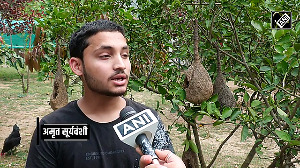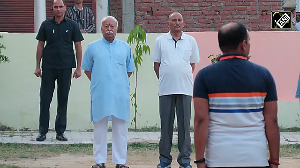Republicans weren't the only people in New York watching their leaders on Monday night.
At select public spaces throughout the city, groups of Democrats and other critics of the Bush administration gathered to watch the Republican National Convention on TV and to offer their own take on the GOP's campaign mantra: "Four more years."
Perhaps the largest such gathering was GOP Watch, located just a few blocks from Madison Square Garden, in an occasional watering hole known as The Tank.
| |||||||||||
Shankar Duraiswamy, 24, had decided to come down from Boston to take in the convention. A law student at Harvard, Duraiswamy is also an incredibly prolific blogger for threeguys.blogspot.com, and had been hanging out at The Tank for much of the day with his Texan friend Padmaja Reddy, a high school teacher in Brooklyn and former classmate from Harvard undergrad.
As with many others in the room, Duraiswamy, who's originally from New Jersey, wants Bush to leave office this November -- he describes himself as a progressive who voted for Gore in 2000.
But he's measured in his words and as someone who dabbles in the idea of going into politics some day, has a pragmatic approach, even going so far as voicing cautious approval to some aspects of the administration.
"I kind of support faith-based initiatives, because a lot of those programs do a lot of good in the inner cities," he says. "But I don't think they'd be serious about implementing it. They'd pander to their religious base."
"I'm sure there are other things," he says, reaching deep into his mind.
"I do think his speech following 9/11 was a great speech" - particularly his attempts to distinguish most Muslims from the acts of terrorists - "I definitely appreciated it. What a lot of us on the left are arguing is there was a moment of unity there, and they squandered it."
Bernard Kerik, former police commissioner of New York, comes on screen and touts the creation of the Department of Homeland Security.
"The Department of Homeland Security is a Democratic idea that Bush opposed originally," Duraiswamy says, noting that the president eventually tacked on clauses that Democrats opposed, namely those that would have resulted in the loss of collective bargaining rights for DHS employees. Bush used this to demonstrate Democratic weakness in the war on terror.
"That's a perfect example of what I mean, of how he squandered a moment of unity."
Senator John McCain's speaking now, talking about how the Democrats, sensibly, think the war on terrorism consists of more than just military responses, but requires legal approaches, solidarity with allies, and better intelligence. People in the room start giggling, as if McCain is endorsing the Democratic platform instead of that of the GOP.
"I love how his laundry list of all that needs to be done in the war on terrorism was met with silence," says Reddy, laughing.
As a high school teacher, Reddy has closely followed the Bush and Kerry educational initiatives.
"It's so easy to say 'No Child Left Behind,'" she says, sitting on a futon in the back of the room. "I love the phrase. I just wish that is what was happening."
She pulls up the White House's Web site on her laptop and scrolls through the text of a speech made by Bush at a recent convention of minority journalists.
"This had me actually yelling at the TV," she says, highlighting a swatch of text. "He places so much emphasis on measuring test scores. There's no real and meaningful discussion of what comes after the measuring. I have a tonnes of students who can't read. I have students who are in ESL" -- English as a Second Language -- "and mainstream high school students at a 4th grade reading level."
In contrast, she thinks John Kerry's education plan is worth backing.
"It strikes a balance between federal support through funding and local control of the education system so teachers have an ability to shape their system of education," she says, sipping a Diet Coke. "Kerry's plan is to reward teachers who get good results. And he's trying to reward another segment, those who are willing to go into the worst testing areas and the roughest schools."
Neither Reddy nor Duraiswamy seem to have particularly strong feelings for Kerry, but both resent the way in which his service in Vietnam has become subject to criticism.
"Was he in Cambodia in 1968? Did he shoot himself?" Duraiswamy says, repeating the top charges. "All this - crap."
"The Gore people didn't touch the fact Bush was a drug addict. I know the Democrats aren't saints but I really do think the Republicans go into the gutter so much more."
On screen, former New York mayor Rudy Giuliani is praising Bush's conviction, and says terrorists will always hear from America.
"Oh, god," says Reddy, "it just seems like an awfully simplistic view of the war on terrorism."
"Did I ever tell you I saw Giuliani with his mistress?" Duraiswamy asks her.
Giuliani tells the crowd how Bush united the country in the wake of 9/11, and recounts the president's inspiring actions at Ground Zero.
"I said, Bernie" -- referring to former police commissioner Bernard Kerik -- "thank god George Bush is our president."
A wave of disgust sweeps over the people in the room.
"Arrgh!"
"Bullshit!" Several people stab the air with their hands, but Duraiswamy just chuckles in disbelief.
Giuliani, in marathon mode, starts talking about the danger of appeasement, a pattern that began with Munich and the 1972 Olympic Games, when several terrorists were released by the German government after attacking the Israeli team.
"Boo, Europe," says Duraiswamy, sarcastically.
"You're either with us," says Giuliani, repeating Bush's famous words, "or you're with the terrorists."
"Except for saying when Pakistan bombs India's Parliament House, India should exercise restraint," says Duraiswamy, who's growing more irked and animated as the evening progresses.
"My mom doesn't like Kerry," Reddy confesses.
"Because he looks tired?" asks Duraiswamy. She nods.
They discuss the need for Democrats to be more robust in countering attacks from Republicans.
"I think we need to fight back, but not in an intellectually dishonest way," says Duraiswamy.
"Clinton said you hit back with a rebuttal, fast," says Reddy.
Duraiswamy nods. "I would defer to Clinton on all issues of political tactics. I think he's a philosopher king."
And at around this point, Giuliani wraps up his speech. The crowd in the room gets up, seemingly sated. But there's more to come, says one of the organisers. It's time for the evening's next political event. It's time for John Kerry-oke Night.






 © 2025
© 2025